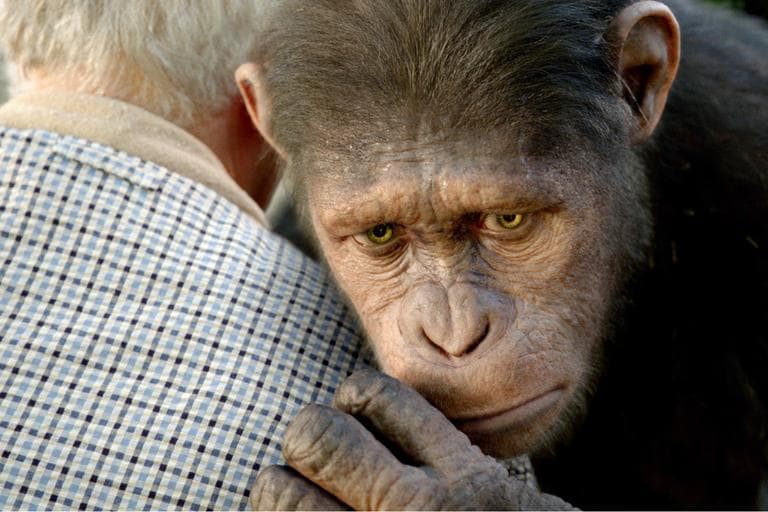Advertisement
Examining The Planet Of The Apes
ResumeWe’re talking about Planet of the Apes, and the latest box office topper to rise.

“Planet of the Apes” leapt from a French novel to the Hollywood screen in 1968, when Charlton Heston played an astronaut thrown onto an upside down planet where apes were in charge and humans were treated like dumb animals.
The premise instantly caught the public imagination. What if the power structure of life was reversed?
It spoke to guilt. It spoke to civil rights. It spoke to prehistoric fears.
Last weekend, the U.S. box office topper was a prequel -– “Rise of the Planet of the Apes.”
The old mojo is still working.
This hour On Point: confronting the planet of the apes.
-Tom Ashbrook
Guests:
Paul Mullins, chair of the Department of Anthropology at Indiana University-Purdue University, Indianapolis. He teaches a class called “Popular Culture” in which he uses the Planet of the Apes series as course material.
Sue Savage-Rumbaugh, primatologist at Great Ape Trust, an organization dedicated to understanding ape language and cognition. Previously she spent 30 years at Georgia State University's Language Research Center. She’s the first and only scientist to conduct language research with bonobos. Earlier this year she was recognized as one of TIME magazine's 100 Most Influential People in the World.
Lewis Beale, features writer who writes frequently about the film industry. His article “'Planet of the Apes” Rises Again” was published in Newsday.
Rick Jaffa, writer and producer of “Rise of the Planet of the Apes.”
From Tom's Reading List:
The New York Times: "The evolution of species takes place over millenniums. Pop-culture franchises just don’t have that kind of time. Rupert Wyatt’s “Rise of the Planet of the Apes,” opening Aug. 5, is the seventh film about the peculiarly advanced simians invented by Pierre Boulle in his 1963 novel “Planet of the Apes” and the first in 10 years."
The Boston Globe: "It’s 1971 and I’m sitting in the old Sack Cheri theater near the Prudential Tower, watching “Escape From the Planet of the Apes,’’ the third in the five-film series kicked off by 1968’s “Planet of the Apes.’’ It’s not a great movie, but it’s good enough, and, anyway, I don’t care. I’m 13! Talking apes from the future! Roddy McDowall and Kim Hunter in semi-convincing latex humanoid chimp makeup! Cheap early-’70s sci-fi apocalypse! Pass the Junior Mints."
The Los Angeles Times: ""Rise of the Planet of the Apes" does it right. Smart, fun and thoroughly enjoyable, it's a model summer diversion that entertains without insulting your intelligence. Adroitly blending the most modern technology with age-old story elements, it's also an origin story that answers the question that's been hanging in the air since 1968: How did it happen that apes rule?"
The trailer for Rise of the Planet of the Apes
http://youtu.be/LaK6khs8aMw
This hour, we'll hear:
“Golden Gate Bridge” from Rise of the Apes
“Main Title” from Planet of the Apes
“Suite” from Escape from Planet of the Apes
“Gen-Sys Freedom” from Rise of the Planet of the Apes
This program aired on August 9, 2011.